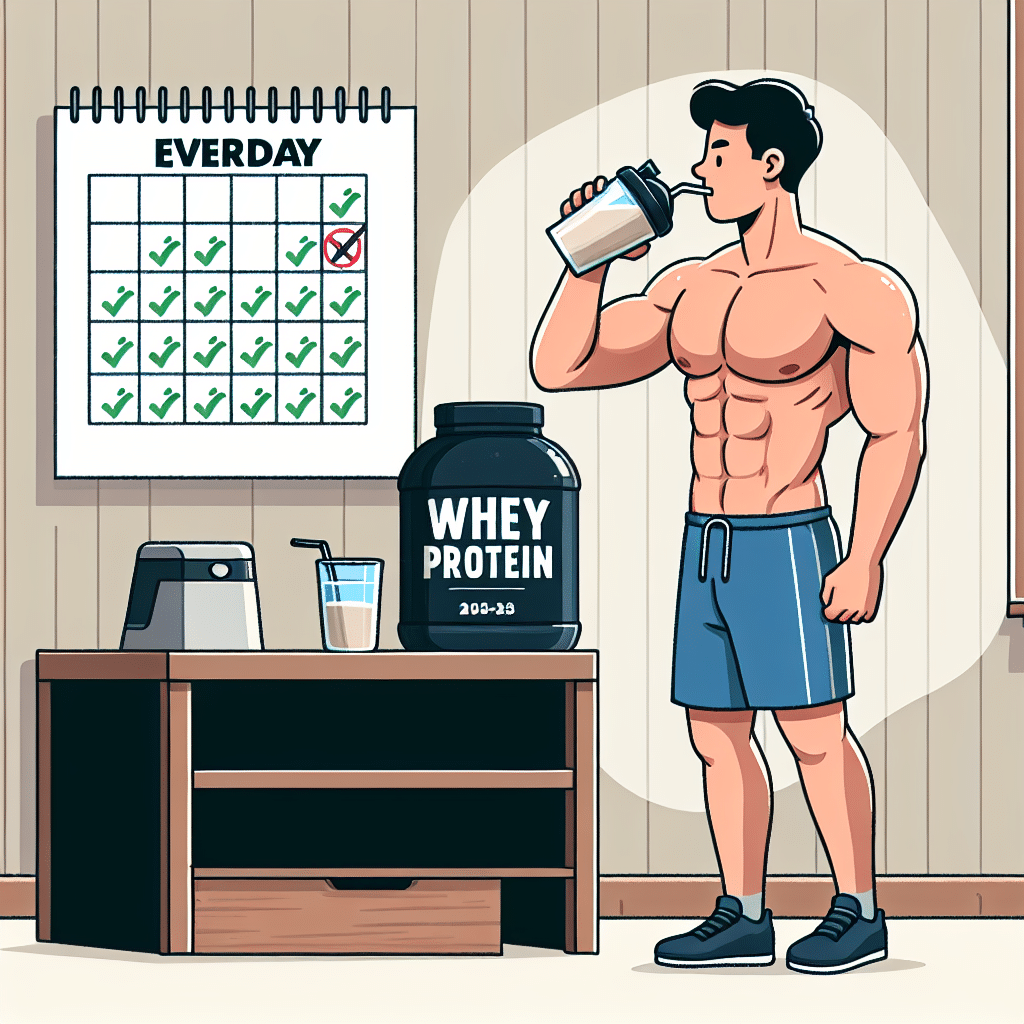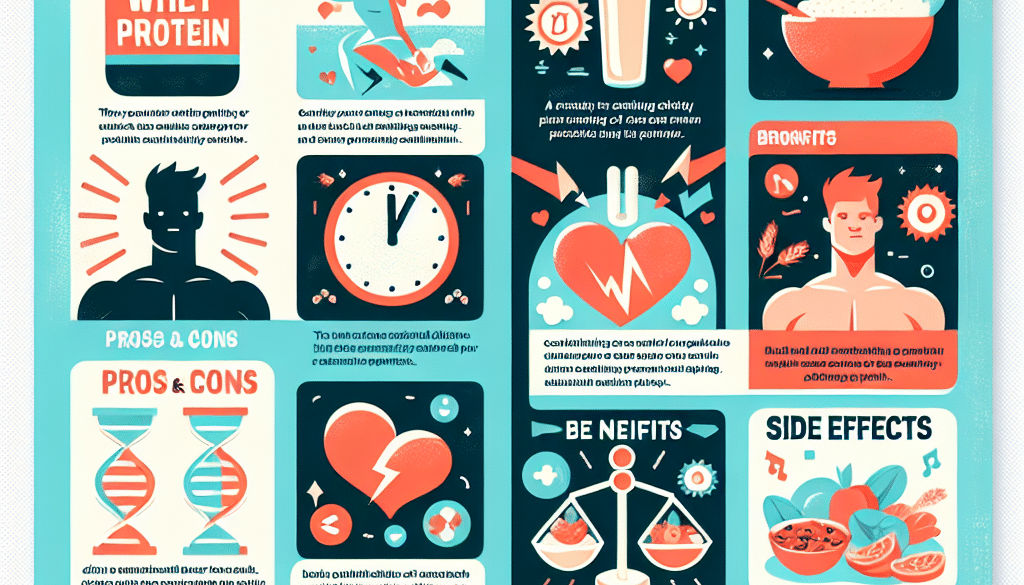Is It Good To Drink Whey Protein Everyday?
-
Table of Contents
- Whey Protein Daily Intake: Is It Beneficial for Your Health?
- Understanding Whey Protein
- The Benefits of Daily Whey Protein Intake
- How Much Whey Protein Should You Consume?
- Potential Risks and Considerations
- Case Studies and Research
- Personalizing Your Whey Protein Intake
- Conclusion: Balancing Whey Protein in Your Diet
- Discover ETprotein’s High-Quality Protein Products
Whey Protein Daily Intake: Is It Beneficial for Your Health?

Whey protein has become a staple supplement in the diets of athletes, bodybuilders, and fitness enthusiasts. Its high-quality protein content and rich amino acid profile make it a popular choice for those looking to support muscle growth, repair, and overall health. However, with its increasing popularity, many people wonder whether it’s good to drink whey protein every day. This article delves into the benefits and considerations of daily whey protein consumption, supported by scientific research and expert opinions.
Understanding Whey Protein
Whey protein is a byproduct of cheese production and is one of the two main proteins found in milk, the other being casein. It is highly regarded for its complete amino acid profile, which includes all nine essential amino acids that the body cannot produce on its own. Whey protein is also known for its rapid digestion and absorption, making it an ideal post-workout supplement.
The Benefits of Daily Whey Protein Intake
Consuming whey protein every day can offer several health benefits:
- Supports Muscle Growth: Whey protein provides the necessary building blocks for muscle protein synthesis, which is crucial for muscle growth and repair.
- Weight Management: High-protein diets have been shown to promote satiety and help in weight management by reducing hunger and calorie intake.
- Enhances Recovery: The quick absorption of whey protein aids in faster recovery post-exercise, reducing muscle soreness and fatigue.
- Boosts Immune System: Whey protein contains immunoglobulins and lactoferrin, which can strengthen the immune system.
How Much Whey Protein Should You Consume?
The recommended daily intake of protein varies depending on an individual’s age, sex, weight, and level of physical activity. The Dietary Reference Intake (DRI) for protein is 0.8 grams per kilogram of body weight for the average adult. Athletes and those engaged in heavy resistance training may require more, ranging from 1.2 to 2.0 grams per kilogram of body weight.
Potential Risks and Considerations
While whey protein is generally safe for most people, there are some potential risks and considerations to keep in mind:
- Digestive Issues: Some individuals may experience digestive discomfort, such as bloating, gas, or diarrhea, particularly those with lactose intolerance or sensitivity to dairy proteins.
- Excessive Intake: Consuming too much protein can lead to unnecessary calorie intake and potential kidney strain in individuals with pre-existing kidney conditions.
- Quality of Protein: Not all whey protein supplements are created equal. It’s important to choose high-quality, low-additive options to avoid consuming unhealthy fillers and sweeteners.
Case Studies and Research
Several studies have examined the effects of daily whey protein consumption:
- A study published in the Journal of the American College of Nutrition found that whey protein supplementation can significantly increase lean muscle mass and strength in individuals participating in resistance training.
- Research in the International Journal of Sport Nutrition and Exercise Metabolism showed that whey protein enhances muscle recovery and reduces muscle damage following intense exercise.
Personalizing Your Whey Protein Intake
It’s essential to tailor your whey protein intake to your individual needs and goals. Here are some tips:
- Consult with a healthcare professional or a registered dietitian to determine the appropriate amount of protein for your body.
- Consider your overall diet and ensure you’re getting protein from a variety of sources, including whole foods like lean meats, legumes, and nuts.
- Pay attention to your body’s response to whey protein and adjust your intake accordingly.
Conclusion: Balancing Whey Protein in Your Diet
In conclusion, drinking whey protein every day can be beneficial for muscle growth, recovery, and overall health when consumed as part of a balanced diet. It’s important to consider individual dietary needs, potential sensitivities, and the quality of the whey protein supplement. By doing so, you can safely incorporate whey protein into your daily routine to support your health and fitness goals.
Discover ETprotein’s High-Quality Protein Products
If you’re looking for premium whey protein supplements, consider ETprotein’s offerings. Their products are known for their neutral taste, non-GMO, allergen-free attributes, and high purity levels. ETprotein caters to a wide range of industries and provides tailor-made protein powder and nutritional supplements to meet your specific needs. For more information or to sample their products, please contact them at sales(at)ETprotein.com today.
About ETprotein:
ETprotein, a reputable protein and L-(+)-Ergothioneine (EGT) Chinese factory manufacturer and supplier, is renowned for producing, stocking, exporting, and delivering the highest quality organic bulk vegan proteins and L-(+)-Ergothioneine. They include Organic rice protein, clear rice protein, pea protein, clear pea protein, watermelon seed protein, pumpkin seed protein, sunflower seed protein, mung bean protein, peanut protein, and L-(+)-Ergothioneine EGT Pharmaceutical grade, L-(+)-Ergothioneine EGT food grade, L-(+)-Ergothioneine EGT cosmetic grade, L-(+)-Ergothioneine EGT reference grade and L-(+)-Ergothioneine EGT standard. Their offerings, characterized by a neutral taste, non-GMO, allergen-free attributes, with L-(+)-Ergothioneine purity over 98%, 99%, cater to a diverse range of industries. They serve nutraceutical, pharmaceutical, cosmeceutical, veterinary, as well as food and beverage finished product distributors, traders, and manufacturers across Europe, USA, Canada, Australia, Thailand, Japan, Korea, Brazil, and Chile, among others.
ETprotein specialization includes exporting and delivering tailor-made protein powder and finished nutritional supplements. Their extensive product range covers sectors like Food and Beverage, Sports Nutrition, Weight Management, Dietary Supplements, Health and Wellness Products, and Infant Formula, ensuring comprehensive solutions to meet all your protein needs.
As a trusted company by leading global food and beverage brands and Fortune 500 companies, ETprotein reinforces China’s reputation in the global arena. For more information or to sample their products, please contact them and email sales(at)ETprotein.com today.












